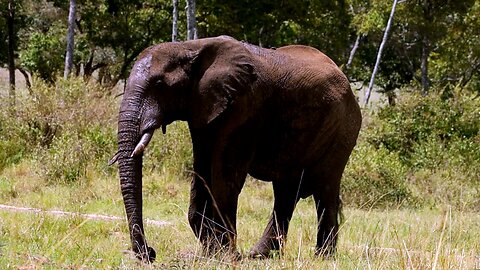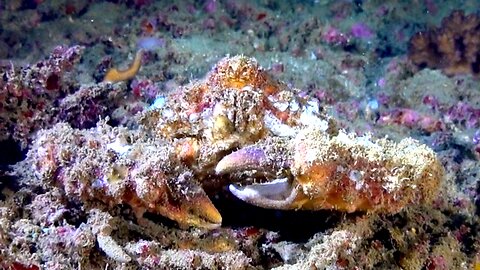
-
Does Red Lobster's closing signal the downfall of mid-grade chain restaurants?
 The Charlie Kirk Show55.2K views 81 comments
The Charlie Kirk Show55.2K views 81 comments -
Majestic elephant roams free in Kenya, Africa
 WildCreaturesIn Kenya, elephants are iconic figures of the wild. They often roam freely in various national parks and reserves such as Amboseli, Tsavo, and Maasai Mara. These majestic creatures play a vital role in the ecosystem and are highly revered in Kenyan culture. It's a breathtaking sight to witness these gentle giants casually traversing the savannah, forging connections within their herds, and going about their daily routines. Their presence adds to the allure and beauty of Kenya's natural landscapes, making it a prime destination for wildlife enthusiasts and photographers alike. A guide has just led these tourists to a majestic bull who is roaming casually in his wilderness. Massive and powerful, he fears nothing in this wild habitat. Bull elephants in Kenya are awe-inspiring creatures, known for their immense size, strength, and confidence. In their natural habitat, they exude a sense of authority and fearlessness, largely due to their dominance within their social structure and their lack of natural predators as adults. With their tusks and sheer bulk, they command respect from other wildlife and often fearlessly assert their dominance in encounters with other animals. However, it's essential to remember that while they may appear fearless, they are still vulnerable to human activities such as poaching and habitat loss. Despite their imposing presence, they rely on the protection of conservation efforts to ensure their continued survival in the wild. Their role as keystone species in the ecosystem underscores the importance of preserving their habitats and maintaining a harmonious balance between wildlife and human activities in Kenya and beyond.3.09K views 1 comment
WildCreaturesIn Kenya, elephants are iconic figures of the wild. They often roam freely in various national parks and reserves such as Amboseli, Tsavo, and Maasai Mara. These majestic creatures play a vital role in the ecosystem and are highly revered in Kenyan culture. It's a breathtaking sight to witness these gentle giants casually traversing the savannah, forging connections within their herds, and going about their daily routines. Their presence adds to the allure and beauty of Kenya's natural landscapes, making it a prime destination for wildlife enthusiasts and photographers alike. A guide has just led these tourists to a majestic bull who is roaming casually in his wilderness. Massive and powerful, he fears nothing in this wild habitat. Bull elephants in Kenya are awe-inspiring creatures, known for their immense size, strength, and confidence. In their natural habitat, they exude a sense of authority and fearlessness, largely due to their dominance within their social structure and their lack of natural predators as adults. With their tusks and sheer bulk, they command respect from other wildlife and often fearlessly assert their dominance in encounters with other animals. However, it's essential to remember that while they may appear fearless, they are still vulnerable to human activities such as poaching and habitat loss. Despite their imposing presence, they rely on the protection of conservation efforts to ensure their continued survival in the wild. Their role as keystone species in the ecosystem underscores the importance of preserving their habitats and maintaining a harmonious balance between wildlife and human activities in Kenya and beyond.3.09K views 1 comment -
Deadly flooding in Kenya bursts dam, creating raging geyser
 WildCreaturesIn recent news, Kenya has experienced intense flooding due to heavy rains, which caused a dam to burst, resulting in significant damage. The flooding has killed at least 17 people washed away crops and farmland, impacting the livelihoods of many farmers in the affected areas. The dam broke at 4am, taking many residents and farmers by surprise. Unable to escape the raging torrents of water, people were drowned, trapped, and swept away by unexpected flooding. Naomy, a famer in this area struggles to grow the carrots and beans that she needs to pay the bills and feed her family. Her crop was completely washed away by the rising water, leaving her broke and unable to pay the farm bills such as rent. She will not have the harvest that she was counting on to put food on the table for the coming months. In an effort to explain her situation to a Canadian friend, she recorded this footage of the dam close to her home. The intense power of the water is unbelievable. Efforts are being made to address the immediate needs of those affected and to plan for longer-term recovery and support for the farming communities impacted by this natural disaster. But there is no relief for the lost earnings that this disaster represents for Naomy, and for subsistence farmers like her. If you wish to help Naomy by donating any amount, this gofundme link allows you to show your support. https://gofund.me/63c7776e Questions can also be directed through David McNab, the video uploader at mojo_videos@hotmail.com. Thank you.3.59K views 4 comments
WildCreaturesIn recent news, Kenya has experienced intense flooding due to heavy rains, which caused a dam to burst, resulting in significant damage. The flooding has killed at least 17 people washed away crops and farmland, impacting the livelihoods of many farmers in the affected areas. The dam broke at 4am, taking many residents and farmers by surprise. Unable to escape the raging torrents of water, people were drowned, trapped, and swept away by unexpected flooding. Naomy, a famer in this area struggles to grow the carrots and beans that she needs to pay the bills and feed her family. Her crop was completely washed away by the rising water, leaving her broke and unable to pay the farm bills such as rent. She will not have the harvest that she was counting on to put food on the table for the coming months. In an effort to explain her situation to a Canadian friend, she recorded this footage of the dam close to her home. The intense power of the water is unbelievable. Efforts are being made to address the immediate needs of those affected and to plan for longer-term recovery and support for the farming communities impacted by this natural disaster. But there is no relief for the lost earnings that this disaster represents for Naomy, and for subsistence farmers like her. If you wish to help Naomy by donating any amount, this gofundme link allows you to show your support. https://gofund.me/63c7776e Questions can also be directed through David McNab, the video uploader at mojo_videos@hotmail.com. Thank you.3.59K views 4 comments -
Decorator crabs are more complex than we realized
 WildCreaturesDecorator crabs are known for their ability to attach algae and small animals to their shells to conceal themselves from predators, but the process is more complex than it appears, and it suggests higher intelligence than we once understood these crabs to have. If the shells of these crabs are cleaned, they will immediately set about replacing their camouflage with the same care and precision as they showed in their first concealment. There are several species of crabs that use plants, animals, and debris from their environment to adorn their shells. Some chew the algae and then carefully hook the pieces onto velcro-like hooks on their shell. They occasionally use anemones or other sedentary animals. They attach the matter to their shells with great precision and care, suggesting that they are purposefully imitating the surfaces around them. When moved from one environment to another, these crabs will quickly replace their adornments with items from the new location, seemingly understanding the need to blend in with specific surroundings. Their disguise is not random or haphazard. Decorator crabs will make use of toxic plants or animals as further deterrence for potential predators. Described by scientists as "perhaps unrivalled" mastery of concealment, these are highly specialized behaviours. Understanding the purpose of their covering, these crabs remain still during the day and they freeze in place when threatened. Some species use only sponges, others use only noxious alga. One species selects stinging anemone for it's protective covering. The anemone benefits from an increased supply of food that is available as it moves around with the crab. Octopus have shown a tendency to avoid these crabs when they are adorned with anemone. The intelligence and purpose of the smallest and seemingly less significant animals is becoming more understood. Perhaps, as we gain greater insight we will also gain greater appreciation and desire to protect them. The balance of nature is a delicate one and humans frequently disrupt this balance in their ignorance of what goes on around them.1.31K views 1 comment
WildCreaturesDecorator crabs are known for their ability to attach algae and small animals to their shells to conceal themselves from predators, but the process is more complex than it appears, and it suggests higher intelligence than we once understood these crabs to have. If the shells of these crabs are cleaned, they will immediately set about replacing their camouflage with the same care and precision as they showed in their first concealment. There are several species of crabs that use plants, animals, and debris from their environment to adorn their shells. Some chew the algae and then carefully hook the pieces onto velcro-like hooks on their shell. They occasionally use anemones or other sedentary animals. They attach the matter to their shells with great precision and care, suggesting that they are purposefully imitating the surfaces around them. When moved from one environment to another, these crabs will quickly replace their adornments with items from the new location, seemingly understanding the need to blend in with specific surroundings. Their disguise is not random or haphazard. Decorator crabs will make use of toxic plants or animals as further deterrence for potential predators. Described by scientists as "perhaps unrivalled" mastery of concealment, these are highly specialized behaviours. Understanding the purpose of their covering, these crabs remain still during the day and they freeze in place when threatened. Some species use only sponges, others use only noxious alga. One species selects stinging anemone for it's protective covering. The anemone benefits from an increased supply of food that is available as it moves around with the crab. Octopus have shown a tendency to avoid these crabs when they are adorned with anemone. The intelligence and purpose of the smallest and seemingly less significant animals is becoming more understood. Perhaps, as we gain greater insight we will also gain greater appreciation and desire to protect them. The balance of nature is a delicate one and humans frequently disrupt this balance in their ignorance of what goes on around them.1.31K views 1 comment


